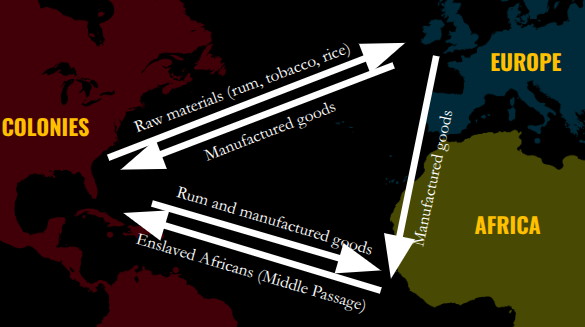History Unit 2 Vocab
1/26
There's no tags or description
Looks like no tags are added yet.
Name | Mastery | Learn | Test | Matching | Spaced | Call with Kai |
|---|
No analytics yet
Send a link to your students to track their progress
27 Terms
Joint-stock company
Used to pay for the risky trip to the Americas.
More people were willing to invest in them because if something went wrong, they would only lose the amount they originally invested
Roger Williams
Puritan minister who believed a person’s conscience was beyond the control of any church authority.
He was banished from Boston
He started the Providence community and one of the first Baptist churches - Their government let anyone worship (Catholics, Quakers, Jews), and they respected the rights of American Indians and paid them for their use of land
Anne Hutchinson
a dissident who questioned Puritan authority. She believed in antinomianism—the idea that since individuals receive salvation through their faith alone, they were not required to follow traditional moral laws. She was banished and she founded Portsmouth
Rhode Island
Providence and Portsmouth merged into a single colony. Because this colony tolerated diverse beliefs, it served as a refuge for many
Quakers
What members of The Religious Society of Friends called themselves. They were prosecuted and jailed for their beliefs.
considered radical
believed religious authority was found within each person and not a Bible/outside source
believed in gender and racial equality,
rejected violence and military service
Halfway Covenant
To be a full Puritan, you had to have confirmed religious experience, a conversion. The church still wanted to be important and influential so they created the halfway covenant where people could become partial members even if they had not felt conversion.
Jamestown
the first permanent English settlement
John Smith was the leader
They developed tobacco that became popular and profitable.
Massachusetts Bay Colony
During the Great Migration, 15,000 settlers went here due to religious and political conflict in England
John Winthrop was the leader
Puritans
a group of more moderate dissenters who wanted to reform the Church of England
John Winthrop
He led 1,000 Puritans to Massachusetts and he founded Boston with them.
Virginia House of Burgesses
first representative assembly in America
in Virginia
Mayflower Compact
Pilgrims made and signed a document that said decisions would be made by “majority wins”.
It was an early form of self government and a simple written constitution
Mercantilism
economic theory that a country’s wealth was determined by how much more it exported than imported
Triangular Trade/The Transatlantic Trade System
system of trade across the Atlantic Ocean. Raw materials (rum, tobacco, rice) from the colonies would go to Europe. Manufactured goods from Europe went to the colonies and Africa. Rum and manufactured goods from the colonies would go to Africa in return for hundreds of enslaved Africans through the Middle Passage.

Navigation Acts
These English laws regarding colonial trade were implemented to promote a mercantilist system.
Only English or colonial-built/operated ships could trade to and from the colonies
Most imported goods had to pass through ports in England.
Specific/”enumerated” goods could ONLY be exported to England. (at first this was just tobacco, but the list expanded over the years)
Sir Edmund Andros
He was sent from England to serve as a governor of the Dominion of New England (a combo of NY, NJ, and other New England colonies). He was unpopular because he imposed taxes, limited town meetings, and revoked land titles.
Dominion of New England
King James II wanted to increase royal control over the colonies by combining them into larger administrative units and getting rid of representative assemblies. He combined NY, NJ, and other New England colonies in the Dominion of New England.
King Philip’s War/Metacom’s War
caused by English settlers intruding on Native land/pushing westward. King Philip/Metacom united many Native tribes. Some tribes like the Mohegans and Pequots supported the colonists because they did not like Metacom. Effects: several villages were burnt, hundreds died, thousands injured. The colonists and their Native allies won, killing Metacom and ending most Native resistance in New England
Bacon’s Rebellion
Sir William Berkeley, the royal governor of Virginia, did not protect small farmers from Native attacks. Bacon, a farmer, led a rebellion who resisted control against Berkeley’s government. Bacon led massacres and raids against Native Americans, including some that had good relations with the colonial government. Berkeley’s government accused Bacon of rebelling against royal authority. Bacon defeated the governor's forces and burnt down Jamestown. Bacon died of dysentery and Berkeley executed 23 rebels.
Headright system
Virginia tried to attract immigrants by offering them 50 acres of land to each immigrant who paid for their own trip and any plantation owner who paid for an immigrant’s trip.
Middle Passage
The forced trip across the Atlantic Ocean to the colonies that around a million African slaves died on
Phillis Wheatley
enslaved woman who published a series of her poems. She was freed soon after this. Her work is impressive due to her triumph over slavery and the quality of her work is great.
Great Awakening
a movement of intense expressions of religious feeling among the masses
Jonathan Edwards
a leader of the Great Awakening. He preached that God was angry with human sinfulness, but people who feel guilty about it would be saved while people who ignored God’s commandments would eternally suffer.
Subsistence farming
when a farmer produces enough food for just the family
Enlightenment
a European rebirth of literature, art, and philosophy that focused on human potential and reason and logic rather than religion.
Town meetings
people who all lived in the same town/village would regularly gather together and vote directly on public issues.